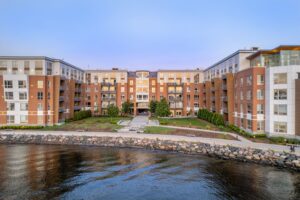
Institutional investors returned to bidder pools for apartment complexes on the market in Greater Boston during 2024, resulting in more competitive sales processes and driving up prices. In July, Goldman Sachs Alternatives paid $85.3 million for the 200-unit Boston East complex. Photo courtesy of CBRE
Boston ranks as one of the top multifamily markets nationally for investors, thanks in large part to its strong underlying fundamentals and dynamic employment market.
Home to some of the country’s top universities and hospitals, Boston has historically been one of the first stops for domestic and foreign capital, and 2024 was no different. Notably, 25 percent of all class A transactions were sold to new entrants into the market; CBRE handled the majority of these sales.
In 2024, the Greater Boston market saw $3.5 billion in transactions over $10 million, up from $3 billion the year prior, amounting to the fourth highest historical sales volume ever. Overall, there were 46 transactions over $10 million in 2024 compared to 35 transactions in 2023, a 31 percent increase.
Among the 2024 transactions, 14 were repeat sales that averaged nearly 30 percent price appreciation over the prior acquisition. CBRE brokered eight of the 14 sales.
Seventy percent of the total sales volume occurred in the second half of the year, compared to 57 percent the same period 2023. With more purchasing opportunities later in the year, pricing was more aggressive.
Cap rates averaged 4.5 to 5 percent in the second half of 2024 compared to 5 to 5.5 percent in the first half. While the compression in cap rates was partly a result of the downward trend in the underlying Treasury markets, investor demand heated up over the summer with the support of strong rent growth and the anticipation of further rate declines.
One notable trend is that many investors in the Boston market are underwriting exit cap rates equal to going-in cap rates, both of which are lower than prevailing interest rates.

Simon Butler
Institutional Investors Up Competition
The second half of 2024 also saw the return of more institutional investors.
Illustrating the depth of the investment market, CBRE received 15 to 20 offers on two recent core-plus offerings, for which final pricing stretched 7 percent to 10 percent over initial bids.
In both situations, there were numerous new bidders, as well as bids from groups which had previously been out of the market. This illustrates the importance of running a process and understanding who has the most competitive capital.
Ranked as one of the top apartment markets in the country by Green Street, Boston is able to attract capital and command the lowest yields because of its strong and stable fundamentals.

Biria St. John
The market has averaged 4 percent annual market revenue per available foot (M-RevPAF) over the past 15 years, resulting in cumulative rent growth 10 percent higher than the average among the top 50 markets.
Looking forward, M-RevPAF growth throughout the Boston market is projected to remain stronger than any of the top 50 markets in the country and nearly two times the average – 3.5 percent annually in Boston compared to just 1.8 percent annual average in the other top 50 markets.
Barriers to Entry Remain High
Another significant contributing factor to the historic stability and growth throughout the Boston apartment market is the limited new supply.

John McLaughlin
With high costs, lack of available sites and restrictive local zoning, Boston is seeing fewer new deliveries compared to other parts of the country.
There were 7,800 new apartment homes delivered in 2024, less than a 2 percent increase to the overall apartment stock and 10 percent fewer new homes than in 2023.
Of the 2024 deliveries, only 1,600 apartment homes were in Boston or Cambridge, the fewest urban deliveries in over 10 years. This downward trend is expected to continue over the next few years, with 21 percent fewer deliveries projected in 2025 and 37 percent fewer in 2026.
CBRE anticipates a significant reduction in deliveries in urban areas where union and high-rise construction costs make very few developments economically feasible.

Brian Bowler
These strong fundamentals are expected to drive investment activity throughout the Boston market. Until housing production returns and elevates to considerably higher levels, the greater Boston market is going to continue to see outsized rent growth.
Simon Butler, Biria St. John, John McLaughlin and Brian Bowler are members of CBRE capital markets multifamily group in Boston.




